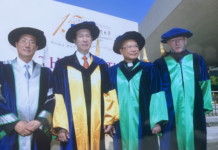
I wish all the readers of this blog a wonderful New Year. May your online courses be innovative, fun and highly effective in developing the knowledge and skills that will be needed in a digital age.
Here’s what’s coming up for this blog over the next week or so:
- In the USA, fully online enrollments continue to grow in 2014 (a report on the latest data from the IPEDS report)
- Book review: ‘The future of the professions: how technology will transform the work of human experts’ (including teachers) by Richard and Daniel Susskind.
- Information about the EDEN 2016 conference in Budapest
- One or more posts on ‘The future of online learning: automation or human empowerment?” which will be my contribution to looking forward to the future.

Outside the blog, I will be doing an official, public launch of my book, Teaching in a Digital Age, in Toronto in February, with the help of Contact North (more information to come). The French translation of the book should be ready by March, and the Chinese version before the end of the year. I’m still looking for someone to do a Spanish translation. There is already a version in Vietnamese.
I will also be giving a presentation on ‘Creating effective online learning environments’ at the Chang Talks conference at Ryerson University, Toronto, on February 17.

Otherwise, I don’t really have any professional plans for 2016. I will continue to scour the news and literature for nuggets about online learning for my blog, which I plan to keep going.
What I am thinking of doing, though, is writing a semi-autobiographical novel, called ‘The Consultant’, which will aim to cover, in a light-hearted way, the hopes and disappointments of educational technology and international development, and the absurdities of university administration.
In thinking about writing this book, I was reminded about the couple who had been married for 75 years who decided to get divorced. A reporter asked:
‘Why after being married so long did you decide to get divorced?’
‘We wanted to wait until the grandchildren were dead, so we wouldn’t upset them.’
I may well have to wait for a few people to die first before I publish ‘The Consultant’!

And lastly, here are some more things to look forward to in 2016:











 Dr. Tony Bates is the author of eleven books in the field of online learning and distance education. He has provided consulting services specializing in training in the planning and management of online learning and distance education, working with over 40 organizations in 25 countries. Tony is a Research Associate with Contact North | Contact Nord, Ontario’s Distance Education & Training Network.
Dr. Tony Bates is the author of eleven books in the field of online learning and distance education. He has provided consulting services specializing in training in the planning and management of online learning and distance education, working with over 40 organizations in 25 countries. Tony is a Research Associate with Contact North | Contact Nord, Ontario’s Distance Education & Training Network.


I’m in Ottawa, Ontario Canada, the home of our Federal Government – as well as thousands of government employees.
While I have a strong background in teaching and learning development, and I am back in college with a group of active college professors, I have been out of this realm for a number of years….and am looking for some guidance.
As a newly hired Project Administrator/Training Development consultant I am about to embark on a year long project to develop cost effective, high ROI training recommendations for government procurement and negotiation managers.
While I am happy to do my own research (and I will of course) – a blog like this is the ideal way to draw on the expertise of a huge subject matter expert audience.
Looking for suggestions on learning methodologies/technologies, as well as current methods for conducting task/gap analysis.
Thank you all in advance…and of course thanks to Tony for making this all possible.
Don
Thanks, Don.
I have to confess that I’m not a specialist in corporate or government training, but I would suggest the first step is to identify the knowledge and in particular the skills these managers will need going forward.
If the answer to that question results in many ‘higher-order’ skills such as critical thinking, problem-solving, and knowledge management, the design will differ considerably than if the main knowledge and skills are procedural, such as following or implementing set policies and procedures, or compliance.
The first (developing higher order skills and knowledge) will demand a more constructivist approach, involving discussion, the use of subject experts in direct (if online) communication with trainees, etc.
If the latter, more automated responses are possible, such as information transmission, computer assessment, adaptive learning, and learning analytics.
There is of course a major cost difference between these approaches, with the more constructivist approach being more expensive, but hen the outcomes are much greater, as well. However, I realise that accountants often privilege cost savings over cost-effectiveness!
However, I’d like to open this up to the many corporate and non-profit trainers who follow this blog. What help or advice can you offer Don? And kudos to Don for trying to plug in to a community practice here
regards
It happens to be I’m back in the college with the same learning group that Don mentioned. Am I right Don? You have opened up a good discussion.
Started as a technology professional more than two decades ago, then a trainer, and a project manager, I am at cross roads when I see the educational technology deployment, and the conception or intake by the teaching and learning community. I don’t know how much one would agree when I say that majority of us take the educational technology piece as the major stake forgetting (or not thinking at all) the purpose why we want to use technology in our teaching and learning. Then we go to implement that major piece called technology and get frustrated that it doesn’t work that way.
I believe that technology has to be an enabler to make our teaching and learning better, so that we can cater for a wider audience of learners with different levels of conceptual abilities, lifestyles, and interests; an enabler that help bridge the gap of knowledge acquisition, the research; not forgetting that we’re in a core activity called teaching and learning. This mode of thinking will help us finding the use of technology as a solution to enhance teaching and learning so that we seek ways and methods of doing things better with the use of technology. We got to remember that our audience consist of millennials, adult learners, professionals, who are managing different lifestyles and engagements, and to find novelty in our approach to capture their involvement.
I think most of the teaching community are pushed by the technology deployment by someone else’s choice. They are trying to implement what is new in the marketplace without thinking how that really could solve the puzzle.
Rather teachers should be encouraged to make choices of technology integration and experiment using technology to find solutions to their teaching problems. In my opinion, the more the teachers explore how to find solutions to their teaching problems using technology, the adaptation of educational technologies will be a success.
I think we got to start from our problem space and venture new possibilities to solve them to make teaching and learning a success. not just shop what is available in the marketplace, because the marketplace is congested.
I would like to know your opinion.
Thanks
Renuka
Many thanks, Renuka, for your thoughtful comments. I couldn’t agree more that technology needs to be used to improve access, produce better learning outcomes, and enable a more individual response to diverse learning needs – not just because a technology happens to be there.
This means thinking about whether using an LMS or lecture capture is going to meet these needs. They might, but just because these are an institution’s core technology, it doesn’t mean that they are necessarily the best solution to the needs of learners in the particular context in which you are teaching. However, thinking this way is hard; you can’t use the same old teaching approach every time. Good luck with your work, Renuka
Tony, Congratulations from Buenos Aires for the public launch of your new book next February! We are working on the translation into Spanish and learning a lot in the process! Thanks!